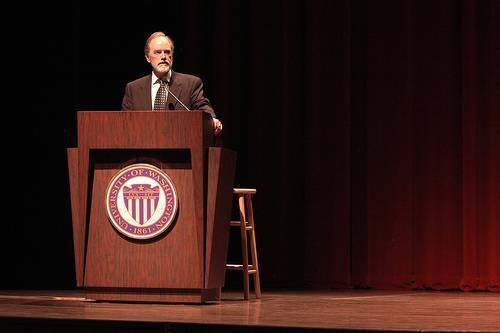The podium and the lectern. We hear these two terms all the time when it comes to public speaking. What is the difference between these two mainstays of public speaking? And when speakers refer to them, are they referring to them correctly?
A podium (pl. podiums or podia) is the raised platform on which the speaker stands to deliver his or her speech. The word is derived from the Greek word πόδι (pothi) which means “foot”. The word “podiatrist” (foot doctor) comes from the same source.
A lectern is a raised, slanted stand on which a speaker can place his or her notes. The word is derived from the Latin word lectus, the past participle of the verb legere, which means “to read”. The word “lecture” comes from the same source.
There are tabletop and standalone lecterns. They come in all sizes.
Small

Photo courtesy of Nathan Colquhoun (nathancolquhoun / Flickr)
Medium

Photo courtesy of Andrew Feinberg (Andrew Feinberg / Flickr)
Large

Photo courtesy of Jeff Hitchcock (Arbron / Flickr)
It is important to make the distinction between the two. And yet, many people say “podium” when they are actually referring to a lectern. (Conversely, I have never heard anyone say “lectern” when referring to a podium.)
There are those who will say that I am just quibbling over semantics. But let’s suppose you have an important speech at an unfamiliar venue. You phone the event organizer and ask if there will be a “podium” when you actually mean a lectern. If the organizer is not on the same (incorrect) wavelength and says “No”, you might end up needlessly scrambling to find your own lectern. If the organizer says “Yes”, you might arrive to find a real podium but no lectern.
To summarize: You stand at or behind the lectern; you stand on the podium.
















51 Replies to “Podium vs. Lectern”
Thanks, John! This is one of my pet peeves–I constantly correct students, for the same reason, and cringe when I hear educated colleagues say “podium” when they mean “lectern.” For my own purposes, when I ask an event organizer about facilities, I ask about a “speaker’s stand” and a “platform” just to make sure there’s no potential confusion. However, nothing is idiot-proof–some “idiots” are just plain ingenious! (No insult intended to anyone, just commenting on human nature.)
Thanks, Donn. I’m with you. I was surprised (and disappointed) when writing this post to learn that Merriam-Webster lists “lectern” as a synonym for “podium”. You read the definition here. I think that they just adopted an “If you can beat ’em, join ’em” position, which is unfortunate. I’ll stick with Fowler’s, which makes the clear distinction between the two.
Cheers!
John
Hi John, I loved your comedy speeches and would love to hear more of your material.
Cheers, Chris
Hi Chris. Many thanks for the comment. I’ll see what I can do about getting some more material on line.
Cheers!
John
John:
I’m not sure what goes on in Europe, but North American usage really doesn’t distinguish between lectern and podium. Webster’s started that way back in 1961, and the Oxford English Dictionary later agreed.
A longer discussion appears in this blog post: http://joyfulpublicspeaking.blogspot.com/2012/03/what-should-we-call-stage-furniture-on.html
Richard
Hi Richard. Thanks for the comment and the (as always) constructive contribution to the discussion. Being North American myself, I know that many people there don’t make the distinction. I can also tell you that many people in Europe don’t make the distinction, either. But on this point I’m a traditionalist … or a purist … or maybe just stubborn! I recognize that language is not a rigid construct and that the meaning of words can change and evolve. An example that comes to mind is “hopefully”, which started out as meaning “in a hopeful manner” but is not more commonly used as “it is to be hoped”.
Still, I was surprised to learn about Merriam-Webster when I was writing the post (see my answer to the previous comment) but believe that it is a case of succumbing to popular usage as opposed to having an etymological basis. But, as you rightly intimate in your post, etymology does not always trump lexicography. For my money, I’ll stick with the distinction, comforted by the fact that I have Fowler’s Modern English Usage on my side. And if you want to take this further, I’ll see you on the podium … or at the lectern … or wherever. 😉
Cheers!
John
PS – No relation to Ben.
Hello John,
As ususal, very informative post. I would like to add that Cambridge dictionary supports your definition whilst Oxford dictionary, although mainly supports your point, has one mention of Podium as a “North American” lectern.
Here are the links:
http://dictionary.cambridge.org/dictionary/british/podium?q=podium
http://oxforddictionaries.com/definition/podium?q=podium
Hi Faisal. Thanks for the helpful sources. I’d seen the online Oxford page before but not the Cambridge one. As I said in my response to Richard above, I’ll stick with the original meanings of the words even though I recognize that, at least in some parts of the world, I am fighting a losing battle.
Cheers!
John
John, I fully agree with your definition, unless someone wants to put his notes on an elevated stage and deliver his speech 🙂
🙂
John,
Thanks for this. I might be revealing my ignorance but I’d never heard the term ‘lectern’ actually used in conversation. I definitely like the differentiation and plan to use it in future … if I can remember.
Cheers,
Bob
Hey, Bob. Great to hear from you. You were missed at the recent Geneva Writers Conference.
“Podium” is one of those words that has just evolved to take on a different meaning in (most of) North America. As long as everyone understands what is meant, it really doesn’t matter. But I figure that every now and then you have to take a stand on some issues and so I’ve decided to take a stand here … on the podium.
Cheers!
John
John:
At my friendly local university library (Boise State) I looked up podium in Fowler’s.
The New Fowler’s Modern English Usage, 3rd edition, edited by R. W. Burchfield, Clarendon Press, Oxford, 1996 has an entry on page 603 for podium:
“A podium is a platform or rostrum (e.g. for a speaker or an orchestral conductor). A lectern is a stand for holding a book (usu. the Bible) in church or a similar stand for a lecturer, etc.“
Then I checked to see it was there in the 1965 2nd edition edited by Sir Ernest Gower, or the 1944 1st edition by H. W. Fowler (both titled the Dictionary of Modern English Usage). It was not. All they said about podium was:
“Podium Pronounce pō; pl. -ia.”
Perhaps Mr. Burchfield was irritated that the lectern meaning had gotten into dictionaries. I think he was trying to lock the barn after the horse was stolen. Pick an edition!
Richard
Hi Richard,
I admire your tenacity and willingness to keep drilling down on this issue until you hit bedrock! Thanks for taking the time to leave such an extensive comment. I will keep my eye out for anything that can further the discussion, but for now I suspect that the lines of demarcation are (more or less) clearly drawn. Whether or not they are drawn in sand is another question.
Cheers!
John
I’m just going to say “stand” to eliminate confusion. Seldom do I need to ensure or even know if a podium is available.
Thank for the comment, Lisa. Stand tall!
John
I’m the Technical Director for a Performing Arts Venue and as we have both lecterns for speakers and podiums for conductors for example, the distinction is often quite necessary.
And my defense in the argument has always been that the first definition in most dictionaries for lectern is something you stand behind, and that is the second or further down definition for podium. So, podium may be correct, but lectern is MORE correct 😉
I also only use lectern for lectern even in conversations when the other person is not. I get strange looks, but always smile and never force MY term.
Maybe a losing battle, but it wont die with me!
Thanks for the comment and example, John. We’re brothers in arms on this one.
John
Hi John,
I had been unclear on the difference between podiums and lecterns but am now unlikely to forget their relative positions in the world of debate. I would be interested in hearing your thoughts on affect and effect sometime in the future if you would care to tackle that topic. I avoid using them if able to do so.
A fun read,
Thanks, Jenny
Thanks very much, Jenny. Glad you liked the post. As I said in one of the discussions, even though the word “podium” has morphed in the United States to now also mean “lectern”, I have decided to be a traditionalist on this one.
As for “affect” vs “effect”, in fact I wrote a short post about those words some time ago. I dug it up and you can read it here.
Cheers!
John
“What is the difference between a podium and a lectern?” was an interview question when I applied for my job as an event manager. I didn’t know the answer, I got the job anyway, my boss explained the correct answer and I’ve never forgotten it! It’s now a huge pet peeve of mine when people mix up the two.
Podium v. lectern is also one of my pet peeves. I refuse to yield on this as I feel it contributes to the slippery slope of improper usage. I also offer up interpreter v. translator and home in on v. hone in on. Please don’t get me started on factoid.
Thanks for the comment, George. I stand shoulder to shoulder with you on podium / lectern and interpreter / translator. (When you have worked in the United Nations system, you know the difference between the two.) But I have to say that I also greatly appreciated this piece by Stephen Fry on the evolution of language. See what you think.
John
Thanks for the comment, Laura. Glad that the selection did not turn on the answer to the question!
Thanks for the nice information. I fully agree with you. But both lecterns and podiums are very good for expressing your thoughts to the audience. Both creates a welcoming atmosphere in the auditorium or conference hall.
Thank you for the comment. Good luck with the lectern sales!
Aloha John, bless you for this! Your brief, concise and non judgemental summary is the perfect takeaway; it’s all about the prepositions, yes? Mahalo!, Don
Thanks, Don!
You have a grammatical error.
Thanks, but that alone is not very helpful. Where, exactly?
I attend many events where a panel of speakers sit at a table that is placed on an elevated platform. When it is time to speak, the speaker rises, walks across the platform, and then stands behind a lectern to deliver a speech. The lectern is also on the platform. Although I would use lectern, I have only heard others use podium. Any thoughts on this situation?
This is one of those cases where a word has evolved to take on a new meaning. Properly speaking, you stand on a podium and behind a lectern. But many people now use “podium” when referring to a lectern.
Great. Thanks for sharing and for adding the pulpit to the discussion.
Here’s my thought: they’re all wrong. It’s not a big deal but technically they are wrong. I don’t mean to stand on my soapbox but…
If the organizer says says “Yes”, you might arrive to find a real podium but no lectern.
I’ve only seen Americans say “podium” when they actually mean lectern. While so many other aspects of life evolve for the better, language always seems to get “dumbed” down. Also, from my extensive experience of working with them, Americans don’t seem to care enough to learn anything outside of their limited circle of knowledge, despite coming across as tremendously confidence (bordering on being cocky). Obviously, ignorance IS bliss.
I know that I am being somewhat pedantic on the podium / lectern issue, and I know that language evolves over time. But, like you, I am sticking with lectern. As for Americans generally, you can’t paint a country of 300+ million people with the same brush. I have many American friends who are open-minded and willing to explore new ideas / cultures / places. I think that those Americans who are narrow-minded – and yes, there are many – are that way because they have not been exposed to that many new experiences. A “limited circle of knowledge” as you have stated. But that is a phenomenon that affects people in every country.
Thanks for the comment, Matt. Depending on how you use it, I suppose a soapbox could be a lectern or a podium.
I’m just now seeing this post, and my mind took me in a similar direction: Can someone stand on a soapbox to specify that one does not stand on a lectern (unless very adept and acrobatic) or hide their notes behind a podium? So yes, even this American – who prides himself on using the language precisely – appreciates the brief soapbox stand on this issue. One last piece of advice before I descend from my virtual podium: When standing on a soapbox, do not place it on a slippery slope.
All such wordplay aside, I enjoyed this article.
sir i am speaking on podeam pls help me
I am sorry, but I don’t understand your request. If you can explain I might be able to help.
Okay, but for a populist poltiicain, like Trump for instance, do those details matter? It’s a question about type of politician versus an accessory – some people put on a show, some make people focus on their words – in theory at least.
Some speaking accessories allow people to express fuller than others – they don’t cover your body, your body language and those kinds of stuff.
Thanks for the comment. Of course, the details don’t matter for a populist politician like Trump. Or for most other people, either. And there are many other things that are more important when it comes to speaking in public. Still, I wanted to write the post to point out the correct way to describe each object.
James is a bigot. Language and word connotations are changing all the time. Americans are closed minded. James is a reactionary. Bully once meant darling or sweetheart. Learn about language, James.
Bigot? Settle down Ed.
From my point of view, managing a performing space that hosts lectures, the difference is important. Conductors stand on podiums and sometimes a lectern is needed at the same time for an emcee or an adjudicator to read notes from. In this technical application, the distinction is important. Also, When dealing with foreigners from latin based languages, the distinction clears confusion.
I don’t correct lay people when I know what they mean, but I always first use the “correct” term when I speak, even though I am often asked to clarify ‘lectern’.
Ah, yes, there it is! “says says”.
Thanks for catching that typo. Corrected.
I LOVE THIS POST!!!!!!!!!!
I correct people all of the time! Yes, it is important to note the difference. The main reason is, that words are derived from sources in the past, many, if not most, of our words are derived from Latin. I was told once that if one would know Latin, they would be able to understand most words! So, there is history with root meaning, as if you look at the word “PODIUM” and from it’s derivation, it does not make sense to misuse. That is called LAZY!!!!!!!!! Yes, it is a lazy, ignorant person who will not use words correctly!
Merriam-Webster’s had a representative chide those of us who stand for reason on this very word/issue. They actually thumb their nose to us!
This is all part of the leftist/politically correct ones where is you stand for principle, reason, logic etc they hate it and call you names! Yet, they themselves cannot offer any good thing. Look at MS. it looks awful and sounds even worse! All about politics correctness. Yes, words change meaning and there are colloquial terms as well, but, there is a ‘science’ to words and to stay grounded and focused we should adhere to it!
BRAVO JOHN!
Thanks, Ernest. I think that most people who misuse the words are just misinformed as opposed to lazy. They hear people say “podium” when they should say “lectern” and so they repeat “podium” because they don’t know any better. I also think it a stretch to ascribe the misuse of “podium” to a “leftist / politically correct” agenda. I can’t imagine either “podium” or “lectern” having a political bent one way or the other. But on the fundamental meaning of the two words, we are in agreement.
The problem is, we have Miriam-Webster agreeing with everybody who misuses a word. They made a whole article insisting “podium” and “lectern” are the same thing, while citing the entomology and immediately turning a blind eye to it. The woke company have decided to just redefine words to coddle the ignorant, making it impossible to tell anyone they’re wrong, ever.
I think that I have found someone who is more bothered by the issue that I am! Thanks for the comment.